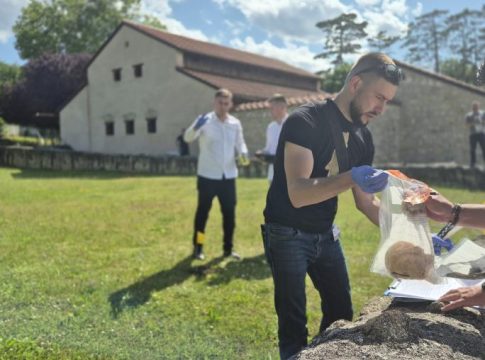International Task Force Trains Officers to Combat Cultural Property Trafficking
VIENNA, Austria — In a significant step toward enhancing global efforts against the illicit trade of cultural property, frontline officers from Georgia, Germany, and Ukraine participated in an intensive training workshop from June 23 to 26. Organized by the OSCE Transnational Threats Department in collaboration with the Austrian Ministry of Finance’s Customs Service, the ninth session in this ongoing series focused on tackling cross-border trafficking of cultural artifacts.
Enhancing Expertise in Cultural Crime
The workshop brought together experts from customs and border services, law enforcement, national prosecutors’ offices, and financial investigation units. They collaborated with the OSCE-led Heritage Crime Task Force, gaining insights into the increasingly complex nexus of cultural property trafficking with organized crime, terrorism financing, and money laundering.
Training sessions covered a broad range of topics, including customs targeting techniques utilizing advanced information systems, cross-border information sharing strategies, and practical analyses of trafficking networks. Participants engaged in hands-on activities, particularly focusing on inspections of vehicles and cargo, as well as foundational crime scene investigation protocols.
Real-World Scenarios and Simulations
To enrich the learning experience, attendees participated in simulated case studies based on actual art and trafficking crimes. These scenarios provided participants with practical experience in conducting investigations, particularly around customs examinations and crime scene analysis.
Cameron Walter, OSCE Customs Adviser and leader of the anti-trafficking program, stated, “This training operation marked a significant advancement in our cross-border efforts to confront and disrupt global art and antiquities trafficking networks.” Walter underscored the importance of utilizing advanced customs intelligence to enhance cargo examination techniques, which are vital for thwarting these criminal enterprises.
Building Trust and Cooperation
The training also focused on fostering mutual trust and cooperation among the participating nations. “Building this rapport allows for stronger exchanges and training discussions, thereby enhancing frontline officers’ abilities to combat the illicit trafficking of cultural property,” Walter explained.
The workshop aimed not just at improving skills but also at laying the groundwork for strategic, cross-border collaboration among law enforcement agencies. This effort represents a vital progression in disrupting networks that pose serious threats to cultural heritage and public safety.
For further information on combating cultural property trafficking or to connect with the Heritage Crime Task Force, please email heritage@osce.org.
As international initiatives continue to evolve, the commitment demonstrated by these nations reflects a growing recognition of the need for robust and coordinated responses to the multifaceted threats posed by cultural property trafficking.

Focuses on crime, public safety, and regional events.
Bio: Marcus is a community-based journalist passionate about reporting impactful stories that matter most to readers.

